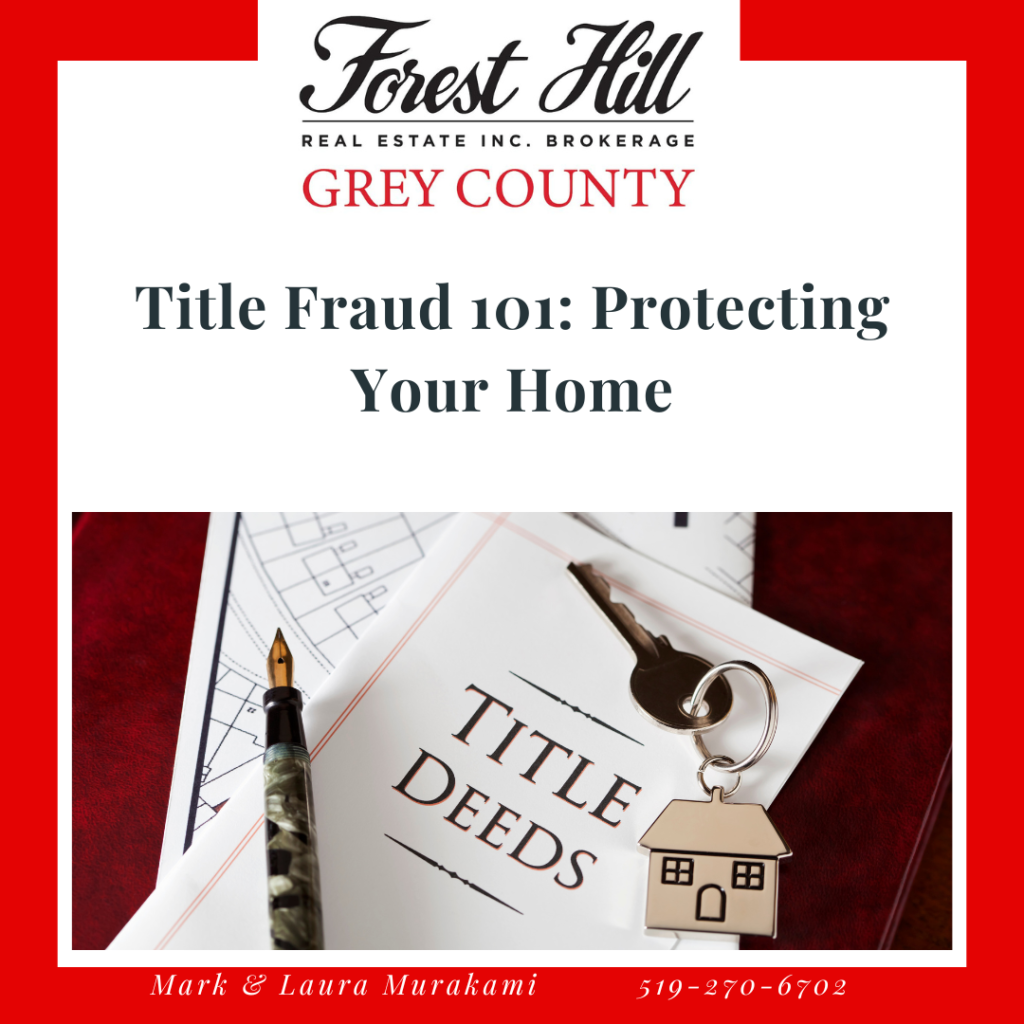
Title Fraud 101: Protecting Your Home
Title fraud is on the rise in Canada, and it’s not just a far-off worry anymore—it’s a real risk for homeowners.
Here’s how it works: fraudsters use stolen identities or forged paperwork to transfer ownership of a property (via the property title) or take out a mortgage WITHOUT THE REAL OWNER KNOW IT’S HAPPENING. By the time the scam is uncovered, the crooks could have illegally sold the property to a new owner and pocketed the money, leaving the rightful owner with the mess. It usually starts with identity theft. Scammers grab your personal info through phishing, social media, or stolen mail, then pretend to be you. Here’s a simple guide to how these scams work and how to keep your home safe from title thieves.
Quick Guide: Title Fraud Tactics in 2025
- Forged Paperwork – Fake deeds with copied signatures are used to make things look legit.
- Identity Theft – Stolen personal info lets scammers pretend to be you.
- Mortgage Scams – Fraudsters can then get loans in your name, leaving you with the bill.
- AI Fakes – Advanced AI creates near-perfect forged documents.
- Fake Rentals – Scammers list homes they don’t own on rental websites, take deposits, and disappear.
space
Who’s Most at Risk for Title Fraud?
Title fraud can hit any homeowner, but some make easier targets than others:
- Mortgage-free owners – No need for a lender’s oversight means these homes are more attractive to scammers.
- Seniors – Long-time home owners may be less tech-savvy and easier to impersonate.
- Newcomers – Language barriers and unfamiliarity with the system can create gaps that scammers can exploit.
- Vacant homes – Vacation or rental properties can be harder to monitor.
With AI-powered scams on the rise, criminals can now transfer titles faster and more convincingly, putting your property and equity at risk.
space
What Happens if You’re a Victim of Title Fraud?
Title fraud can turn your life upside down:
- Financial loss – Scammers may steal your home’s value or take out loans in your name.
- Costly legal fights – Reclaiming your title can mean a long, expensive court battle.
- Credit damage – Fake mortgages or loans can hurt your credit score and your future borrowing power.
- Stress & anxiety – This is self-explanatory. The shock and uncertainty of the situation can have a heavy emotional toll.
- Life plans on hold – Selling, refinancing, or passing on your home to a child or family member can become a challenge.
space
How to Protect Yourself from Title Fraud
Stay one step ahead of scammers with these smart moves:
- Get Title Insurance – Title Insurance can cover legal fees and any losses in the event fraud happens.
- Check Your Title – Monitor property records online for suspicious changes.
- Guard Your Identity – Shred documents, use strong passwords, and keep your SIN safe.
- Use Digital ID Tools – Advanced verification can help to catch fake IDs and forged documents.
- Work with Experienced Professionals – Trusted real estate pros, lenders and lawyers know how to spot red flags early.
- Watch Your Credit – Check your credit report regularly for strange entries or inquiries.
- Secure Your Mail – Lock mailboxes or use a P.O. box to block mail theft.
- Be Careful Online – Verify contacts, avoid using unfamiliar links, and stick to accredited professionals.
A little vigilance now can save you from big headaches later.
space
How Your Real Estate Professional Can Help Prevent Title Fraud
For lawyers, agents, and lenders, stopping title fraud protects both their clients and the market. Here’s how pros can help:
- Verify every deal – Use digital ID checks (realtors have to complete FINTRAC paperwork and verify your ID, for example) and multi-factor authentication.
- Educate clients – Teach homeowners about risks, title insurance, and monitoring.
- Work together – Share fraud alerts with banks, registries, and authorities.
- Promote title insurance – Available through your lawyer at a small cost, Title Insurance can save huge losses.
- Keep solid records – Detailed files make fraud easier to spot and fight.
A proactive approach builds trust and keeps real estate transactions safe.
space
Fraudsters are getting smarter and harder to spot with scams ranging from forged home ownership papers to AI-powered tricks. Whether you own a home or work in real estate, knowing how these schemes work—and how to protect yourself—is key. Simple steps like getting Title Insurance, keeping an eye on your property records, guarding your personal info, and using secure ID verification tools can help to make a huge difference. Trusted lawyers and real estate professionals can also help to spot red flags early on. The risk is real: one case of title fraud can drain your finances, damage your credit, and even cost you your home. But with a little vigilance, the right tools, and expert advice, you can stay ahead of the scammers.
The bad guys aren’t slowing down, so neither should we. Stay informed, work with trusted experts, and take proactive steps to protect what’s yours—because when it comes to title fraud, prevention really is the best defense.
space
space




